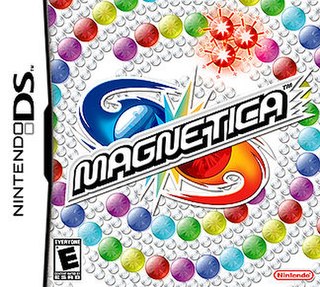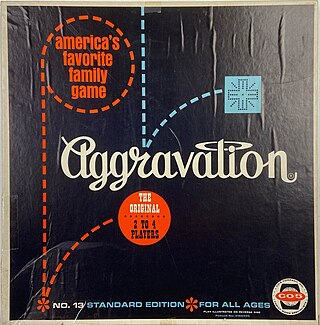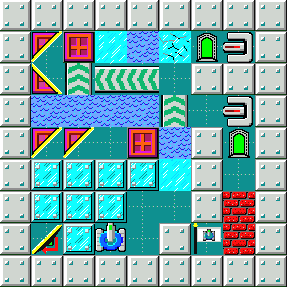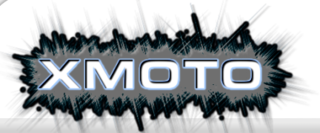
Liero is a video game for MS-DOS, first released by Finnish programmer Joosa Riekkinen in 1998. The game has been described as a real-time version of Worms. Liero is Finnish for 'earthworm' and is pronounced. Inspired itself by the earlier game MoleZ, Liero provided inspiration for the later games Soldat and Noita.

Oxyd is a 1990 puzzle video game developed for the Atari ST and ported to the Amiga, Macintosh, MS-DOS, and NeXT by Dongleware Verlags GmbH. It is a game of puzzles and tests to restart all the oxygen generators on the player's home planet. The Oxyds must be restarted by opening them in pairs of matching patterns, and matching colours.

A marble is a small spherical object often made from glass, clay, steel, plastic, or agate. They vary in size, and most commonly are about 13 mm in diameter. These toys can be used for a variety of games called marbles, as well being placed in marble runs or races, or created as a form of art. They are often collected, both for nostalgia and for their aesthetic colors.

Frozen Bubble is a free software clone of Puzzle Bobble for a variety of home and mobile systems.

Beyond Zork is an interactive fiction computer game written by Brian Moriarty and released by Infocom in 1987. It was one of the last games in the Zork series developed by Infocom. It signified a notable departure from the standard format of Infocom's earlier games which relied purely on text and puzzle-solving: among other features, Beyond Zork incorporated a crude on-screen map, the use of character statistics and levels, and RPG combat elements.

The Sentinel, released in the United States as The Sentry, is a puzzle video game created by Geoff Crammond, published by Firebird in 1986 for the BBC Micro and converted to the Commodore 64, Amstrad CPC, ZX Spectrum, Atari ST, Amiga and IBM PC compatibles. The Sentinel was among the first games to use solid-filled 3D graphics on home computers. It won numerous awards upon release and has since appeared on several "best video games of all time" lists.

Magnetica is a puzzle video game for the Nintendo DS, released as part of the Touch! Generations series. The game was developed by Mitchell Corporation and published by Nintendo, and is based on Mitchell's 1998 arcade game Puzz Loop.

UltraStar is a clone of SingStar, a music video game by Polish developer Patryk "Covus5" Cebula. UltraStar lets one or several players score points by singing along to a song or music video and match the pitch of the original song. UltraStar displays lyrics as well as the correct notes similar to a piano roll. On top of the correct notes UltraStar displays the pitch recorded from the players. UltraStar allows several people to play simultaneously by connecting several microphones possibly to several sound cards. To add a song to UltraStar, a file with notes and lyrics is required, together with an audio file. Optionally a cover image, a backdrop image and a video may be added to each song. UltraStar comes preloaded with a short sample from Nine Inch Nails hit "Discipline" from The Slip album.

Aggravation is a board game for up to four players and later versions for up to six players, whose object is to be the first player to have all four playing pieces reach the player's home section of the board. The game's name comes from the action of capturing an opponent's piece by landing on its space, which is known as "aggravating". The name was coined by one of the creators, Louis Elaine, who did not always enjoy defeat.
Nicklas Nygren, better known by the handle Nifflas, is an independent Swedish video game developer. He is known for his freeware Knytt series and along with another freeware game, Within a Deep Forest. He has lived in Umeå, Sweden and Copenhagen, Denmark.

OpenCity is a free and open-source software 3D city-building game started in 2003 by France-based Vietnamese programmer Duong-Khang Nguyen. The game mechanics are similar to Simcity, although the game developers do not strive to make it a direct Simcity clone.
Fish Fillets NG, originally just Fish Fillets, is a puzzle video game developed and released by Altar Games in 1998. The game's goal is in each level to find a safe way out for both of the two fish. Fish Fillets is comparable to other sliding puzzle games such as sokoban and klotski, while it has a few additional elements and rules.

LaserTank is a puzzle video game requiring logical thinking to solve a variety of levels. It is open source, careware, and can be used for free. The player must be able to concentrate and think ahead as in playing chess or checkers. Contradicting its name, LaserTank is in no way an action game. Although a player may try to solve a level quickly, there is no requirement to do so, so poor coordination and poor reflexes will not impede a player. Experience allows the player to learn a number of techniques and tricks that need to be used to solve difficult levels. LaserTank is NP-complete meaning that one can construct levels which are hard to solve for computers.

Samorost 2 is a puzzle point-and-click adventure game developed by Amanita Design. Released for Windows, OS X and Linux on 8 December 2005, the game is the second video game title in the Samorost series and the sequel to Samorost. On 5 November 2020, the game received an update with enhanced visuals, brought fullscreen support & replaced level codes with a level select system. This version also received iOS & Android ports.
Secret Maryo Chronicles is a free and open-source two-dimensional platform computer game that began in 2003. The game has been described by the German PCtipp as a Super Mario Bros. clone, but with a similar gameplay to that of Super Mario World (1990).

X-Moto is a free and open source 2D motocross platform game developed for Linux, FreeBSD, Mac OS X and Microsoft Windows, where physics play an all important role in the gameplay. The basic gameplay clones that of Elasto Mania, but the simulated physics are subtly different.

TripleA is a free and open-source turn based strategy game based on the Axis & Allies board game.

Zaz is a free software (GPLv3) puzzle video game which is similar to Zuma.

Blobby Volley is a free and open-source sports computer game series in which two blobbed shaped entities play volleyball against each other. There are multiplayer and single-player modes.















